In an exclusive interview, former Pakistani Prime Minister Imran Khan speaks with Tom O'Connor, Newsweek's Senior Foreign Policy Writer and Deputy Editor of National Security and Foreign Policy, about the ominous road the country he once led is going down, his deepening legal troubles and what he believes was the role of the United States in his ousting from power over a year ago.
With the nuclear-armed nation of nearly 250 million people mired in economic and political turmoil, the conflicting narratives over Khan's saga has threatened to push Pakistan over the edge.
It's the second time in less than two years that Newsweek has interviewed the cricket star-turned-politician who leads the Pakistan Tehreek-e-Insaf (PTI) party, having spoken with him in September 2021 during his premiership. The following April, he faced a no-confidence vote that pushed him out of power, which was followed by a slew of charges lodged against him under the incoming administration of current Prime Minister Shahbaz Sharif, whom Newsweek interviewed last August.
Today, Khan is largely confined to his residence in Lahore while on bail from successive court appearances on allegations ranging from corruption to terrorism and even murder. In all cases, he has maintained his innocence and accused the Sharif administration along with the influential armed forces of pursuing a concerted campaign to silence him as elections loom in October.
Khan asserts that the conspiracy began while he was in office, as he claims political forces within Pakistan swayed Washington to portray Khan as an enemy of the U.S. Though he rejects this characterization of his views, he does accuse the West of double standards and defends his own non-aligned policy in international affairs, even if he believes it ultimately helped lead to his removal from office and the beginning of a long, growing list of problems.
The following transcript has been lightly edited for length and clarity.
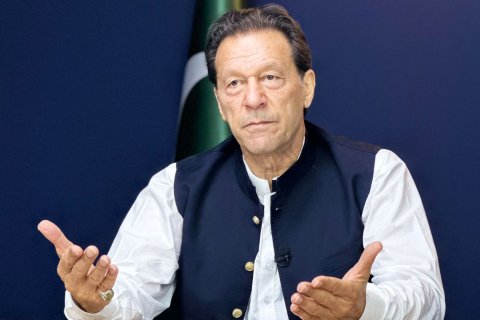
Newsweek: It's been less than two years since the last time I interviewed you, when you were on the cover of Newsweek magazine. Then, of course, you were the prime minister. And since then, you've been ousted, you've been shot, you've been arrested, and you're still in the midst of this arduous legal process. Can you tell us what's happened, and where are you right now in this process?
Khan: Well, the people who conspired to pull down my government, which was the ex-Army Chief [Qamar Javed Bajwa], and afterwards, he quite clearly stated [as such]. Because within his own circles, within the army circles, they kept asking, "Why did they remove me?" So, he actually then justified it that I was dangerous. He claimed I was dangerous for Pakistan. And they gave some other reasons, too.
So, what happened subsequently was unique in Pakistan, because on April 9 last year, my government was removed. And on April 10, which has never happened in this country, hundreds and thousands of people came out on the streets to protest. So that took the military establishment, which means the army chief—by the way, military establishment means one man. There's no democratic process there. It's just one man that makes decisions, and he's very powerful. Over the years, the army chief has gathered powers which probably no other army chief has in the world, I guess [except for] places like Myanmar and Sudan, but in democracies, it's unheard of.
But when the people came out, it was a shock to everyone, including myself. By the way, I'd never expected people because we never planned it. It was a spontaneous reaction. And then I went to the public, had a series of rallies, and all were massive rallies, bigger than any rallies in Pakistan. And then there were by-elections. So, my party swept. Out of 37 by-elections, my party won 30, with the army siding with the government. Normally, it is said that the establishment makes you win, but the establishment was on the other side with all the 22 parties or 12 parties. And despite that, we swept 30 elections.
Clearly what happened was, having realized that they made a mistake, the army chief, and whatever his advisers do, they decided that, whatever happens, I should not be allowed to come back.
So, what you're seeing right now is that same process going on, the assassination attempt was part of it. There were two, by the way, there was another assassination attempt on me on March 18. They were part of that, whatever happens, I can't come back. Then, this false flag operation, which happened on May 9, they could easily have come and pick me up, the police could have come and said, "Here's your warrant, and we're taking you to jail." That could have happened, but instead, while I'm sitting in the High Court [of Islamabad], I have this commando operation where they come and smash everything...They beat up everyone. I was hit over my head.
And then they took me away like I was some sort of the biggest terrorist in this country, not someone who was having the biggest party in the country. But the moment I was in the jeep, suddenly they were completely polite, very courteous and polite.
So, when I look back, it was a planned thing because they want a reaction. And as a result of the reaction, this arson took place. Now, my party has been [around] 27 years [since] I started [it]. Never have we indulged in arson or violence, even when I was shot. There were demonstrations, but there was no arson. This time, when I'm inside, three days or four days later, the Supreme Court calls me up and then releases me. It was unlawful, clearly what they did was unlawful. They call it abduction. It wasn't an arrest.
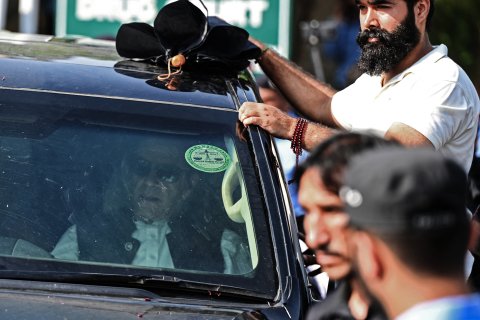
Meanwhile, I come out and find that this corps commander's house had been burned and a television radio station had been burned, so I was quite surprised. And I thought maybe the mob had gone mad. Then we discovered that it was a planned thing. I mean, everywhere the word started coming that there were these people planted who did this. And amazingly, the corps commander's house is the most heavily guarded house. And yet, while the crowd took two hours to get to his house, the police knew where they were going, there was no protection. And yet the head of our Punjab party is sitting there, this woman [Yasmin Rashid], and she's telling everyone on the loudspeaker not to go inside the house.
Yet, not only are we blamed, but in in the next 48 hours, or maybe slightly more, my entire leadership is in jail. But worse, 10,000 of our workers are put in jail. Now this couldn't have been unless it was a planned operation, pre-planned. How can you immediately know where the workers were? So immediately, 10,000 workers are put in like a military operation. The rest of the workers are in hiding. The senior leadership can only come out if they go on the media and say, "I'm quitting the party." So, that's how the senior leaders have come out. Most of my people are in hiding now who are not in jail.
So, I'm quite isolated right now, and I have to face cases. I've got over 150 cases. Yesterday, I was in court, I had 19 cases. It's unheard of—19 bail cases, and ranging from murder—I mean, the latest case that they blamed me for murder. Out of the 150 cases, one of the cases was that some lawyer had done a treason case on me, which was a frivolous case, it would have been thrown out, irrelevant case really, and the lawyer gets shot in Quetta, which is a remote province. And they put a murder case on me.
So, this is the situation now. I have these cases against me, my leadership is in jail, unless they renounce, and a lot of them have renounced being in the party, and the other office bearers are either in hiding or in jail, the few of the 10,000 people, and it's ongoing, the arrests are happening.
But it's not just that. The entire media, which has asserted its independence over a period of time, the last 20 years, from a controlled media we went to a completely, in fact, overboard media...but very vibrant, they have been [told] that my name cannot be mentioned on television today—there are about 30, 40 channels. Everyone has been instructed. First, they stopped my interviews and speeches, and now I'm completely blacked out.
But the worst thing is our judiciary. There too was a movement. Sixteen years ago, I was put in jail when I joined the movement for an independent judiciary. Our chief justice had been removed by the then-dictator General [Pervez] Musharraf. So, we all stood for an independent judiciary. And actually, that movement worked. The chief justice was reinstated. And from then onwards, the judiciary became fairly independent—in other words, they would be protecting us from the excesses of the executive. And so, we were moving more towards democracy with an independent judiciary, vibrant media. And the only issue was the Election Commission, which was still a bit controlled. Now everything is rolled back.
The judiciary is now controlled; they [government officials] don't listen to the verdicts of the judiciary. One of our office bearers, five times he got bail in the cases he's been in. Five times they slapped another case and put him back in prison...He can only get out if he renounces being part of PTI.
So, this is the situation right now. The party is being systematically dismantled. But bear in mind, this party has ratings today over 70 percent. It is by far the most popular party in our history, and it's a federal party. Normally, the parties are confined to the four provinces. So, the rating is unprecedented in our history. I mean, in what Pakistan is now, no party is as popular, but they're trying to dismantle it. But in trying to dismantle it, they're actually dismantling the democracy.
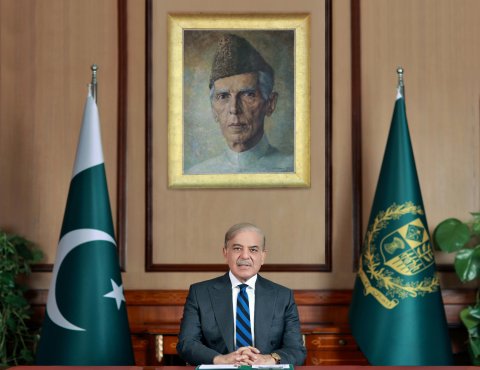
What you're outlining and what you're saying, is this planned operation, a false flag, a conspiracy. And you've named the military establishment, you've named the Sharif administration, and you've named the United States before. Who's behind this, and how are they coordinating? Where are they trying to achieve here in Pakistan? What's their goal?
Let me just give you exactly what happened. March 6, 2022, there's a meeting between the Pakistani ambassador Asad Majeed [Khan] and the U.S. Under Secretary of State for South Asia Donald Lu. A cipher is the secret, coded message that you get from your ambassadors...So, I get this message. Donald Lu is telling the ambassador that unless I, Imran Khan, am removed as the prime minister in the no-confidence motion, there'll be consequences for Pakistan. I mean, there were other things, but this was the main thing.
Next day, there's the no-confidence motion tabled in the National Assembly. And before that, we see that the American Embassy is meeting our parliamentarians, our backbenchers...[We know] they were meeting because we had the report of meeting... Some of the guys who were going into the American Embassy beforehand were first to jump ship. So, I was puzzled, because I didn't quite understand why would the U.S. object to a deal.
One thing was, I had gone to Russia. Unfortunately, when I arrived, that's the day [Russian President Vladimir] Putin moved into Ukraine. I mean, he certainly didn't consult me. Otherwise, had I known, obviously, I wouldn't have gone. But at the time, our foreign office had said we didn't have a good relationship with the Russians for a long time. And the whole sort of stakeholders, including the army leadership, they all wanted me to go because there was military hardware they wanted from Russia, and then we wanted cheap oil from Russia, plus get a pipeline, plus wheat—we have 2 million tons of wheat we import from them.
So, that's why the trip was planned. When I got there, of course, the same day, Putin walked into Ukraine. So, I think I was criticized for that. But what could I do?
When we got back, there was one issue, they [the U.S.] wanted us, through the United Nations, to condemn Russia. But I kept telling them that, look, if we condemned them, we had done a deal with them for cheaper oil, just like India, same deal as India, and also wheat—we were, as I said, 2 million tons short of wheat—so I said, if we condemn them right now, what about the impact it's going to have on our population?
Because the biggest reason for inflation in our country is always oil. Thirty-six percent of our imports are petroleum, and the oil prices already were going up. Now, they're about $70 to $80 a barrel—then it had reached $110. Anyway, my point was, let's stay neutral like India. I think maybe that was it.
Maybe it was the Taliban. [For] 20 years I kept saying there would be no military solution in Afghanistan, because I know the history. We already [have a] bordering province to Afghanistan, which is also Pashtun. Taliban are Pashtun, they're also Pashtun...So anyway, I'd been saying this throughout, that there was no [military] solution. So, I think that was maybe taken as anti-American, because I didn't believe in that military solution.
But later on, we discovered that it was the army chief. We found out six months after my government went, that the army chief actually had appointed a lobbyist, an ex-Pakistani ambassador called Husain Haqqani, and he had paid him $30,000, when my government was in power, and we didn't know this. He was lobbying for the army chief who wanted an extension, and he wanted clearance from the U.S. And so, this guy was actually working [for the army chief]. He actually did a tweet that General Bajwa is pro-American, Imran Khan is anti-American.
So later on, we discovered that this was actually my own army chief [who] was feeding this thing. So, it wasn't really initiated from the U.S. It was him who had sort of made me into some anti-American...So, it was a conspiracy. It was the army chief, it was the guy who's the prime minister right now, and the U.S. came into it thinking as I'm someone anti-American.
I would like to talk a little about the situation in Pakistan right now, where we have a severe economic crisis, the effects of climate change and, on top of that, some real security concerns with the rise of militant activity. Are you concerned about the future of Pakistan's stability and the worst-case scenarios in terms of, perhaps, a return to military control, or even a total state collapse of a nuclear-armed nation?
When I discovered that General Bajwa was in the last two, three weeks actually trying to undermine my government, I had a meeting with him, and I tried to explain to him that, look, this is a commodity super cycle going on, where the energy prices have hit the roof. We are very delicately balancing our economy. If this government goes at this period, it will create political instability. And once there's political instability, the economy will go into a tailspin. And these guys who you're going to bring because they're the alternative, they have already been three times in government and twice they've left the economy bankrupt.
So, I said they won't be able to control it. Then I sent my finance minister the next day to Bajwa, who explained to him how delicately the economy was balanced. But once there's instability, there will be a lot of problems, especially on our currency, and then we won't be able to control it. So, he was warned. And this is exactly what happened.
The economy from then onwards started going down, our currency started going down. And then it started hitting our industry. The measures they took then to cut the current account deficit, that had an impact on our industry, which was growing. This is all recorded in the economic survey of Pakistan. We actually were growing in the last two years on an average of 6 percent. We were one of the highest growth rates in Pakistan.
And our industry was all around, the agriculture, production sector, agriculture and industry were really after 17 years growing. So, the moment the measures they took once the current currency started falling, inflation started going up, because the moment your currency falls, all imports, especially the inflexible imports like oil and food, palm oil, all of them go up. So, the inflation started going up.
And since then, it has just kept going down. Now we are in probably the worst economic situation in our history. We have the worst inflation. A year ago, when we were there, it was 12.2 percent. Today it is 38 percent inflation, highest in our history. Our exports are falling. So, the dollar income is going down, our exports have gone down by 13 percent, remittances from overseas have gone down by 13 percent. We have record debt. Right now, we've increased the amount of debt. Our entire revenue collection goes into servicing the debt, the debt is still there, but just paying the interest on the debt, the whole revenue goes in there.
So, it is the worst economic situation right now. And the worry is that what this establishment is trying to do right now to crush us is only creating more economic instability.
The only thing that can bring stability are free and fair elections. What you would want in Pakistan in this situation are free and fair elections, a government coming with public mandate, backing of the public, which then can take the very difficult decisions of restructuring the whole economy, bringing in reforms, the whole governance reforms needed and so on. For instance, our government corporations are making huge losses, but unless you have public backing, public mandate, you cannot really restructure them.
So, therefore, we are stuck in this situation. The measures they are taking are creating more economic instability and political instability, which then is feeding into the economic instability. Our currency is now even worse than Sri Lanka, our inflation is even higher than Sri Lanka right now. And this is unsustainable, because sooner or later something will give, because...in just one year buying power has fallen by about 35-40 percent.
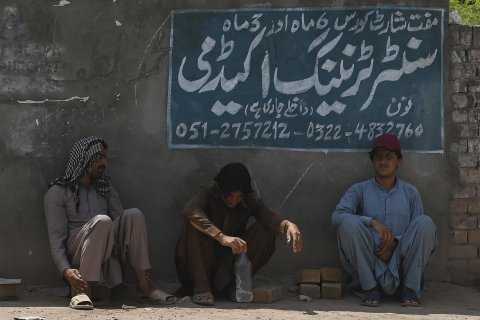
Last time we spoke beyond Pakistan itself, we spoke about China, we spoke about Afghanistan, we spoke about the situation in the region and in the world, and there have been these great geopolitical shifts, both while you were in office and after you've been in office, the current battle for influence between the U.S. and China, Russia's war in Ukraine. Where is Imran Khan in all of this, and where is Pakistan, where should Pakistan be in your vision?
Look, what Pakistan needs desperately is stability. For stability, Pakistan should stay out of any conflict. Because that war on terror that Pakistan joined—which by the way I did oppose—it was a ridiculous thing for us to join the U.S. war on terror, simply because we had trained the mujahideen in the '80s to fight the Soviets. Fighting them was considered jihad, and jihad was glorified, and we have trained people in jihad to do guerrilla warfare against the Soviets.
So, the whole war against the Soviets was conducted from the Tribal Areas bordering Afghanistan and, again, 70 percent of Pashtuns on our side of the border, 30 percent on the other side, and Taliban are Pashtun. Most of the mujahideen commanders were Pashtun, except for Ahmad Shah Massoud. So, I kept telling them, "Look, if you now join the U.S. war, how are you going to convince these people that fighting the Soviets was jihad, but fighting the U.S. is terrorism? They are going to turn against us. How can you suddenly convince them that jihad is no longer glorious?"
And that's exactly what happened. 80,000 Pakistanis died in that [war on terror]. And over $100 billion was lost to the economy, because there were suicide attacks, bomb attacks going on all over the country. So, I opposed that at the time. And I think that also might have been considered being anti-American. Because, for some reason, if you don't agree with the U.S. foreign policy, you turn anti-American.
But all I'm saying is that Pakistan, the lesson we learned from that was that we need peace and stability. We have a population now of almost 250 million people. Now 250 million people with over 100 million people vulnerable, 50 million people below the poverty line. What Pakistan needs is stability, to have trade with its neighbors, to have peace in Afghanistan, so you can trade with the Central Asian countries who can go through Pakistan to the Indian Ocean.
So that was my idea, that look, we should stay neutral in conflicts. We need to worry about our population, which is the fastest-growing population. We have a huge amount of illiterate, out-of-school children, our health issues are terrible, we have very high child-mortality rates.
So, my concentration always was, "first worry about your own people rather than getting involved in conflicts." And I basically agree with the Indian foreign policy, because India throughout stayed non-aligned. India's foreign policy, look at them, now—they're trading with China, they're trading with Russia, and yet they're part of the strategic alliance with the United States. And that's how it should be, because your foreign policy must reflect what is in the interest of your own population. And that somehow, in the terms of I guess the U.S., is considered anti-American.
And if Pakistan does not achieve this stability, where is the nation headed?
You know, we are at a genuine crossroads in our history of 75 years. Now we are facing either you have free and fair elections, and you go towards democracy and rule of law and strong democratic institutions, or where we are headed right now [which] is basically a totalitarian state. We are now headed towards those dark ages of martial law where there are no fundamental rights.
I mean, our people picked up—10,000 people being picked up. The maximum people involved in the arson could not have been more than 200. There were only four places that got burned. So, 200, okay, 300? How do you justify 10,000 people for one month have been put in jail in inhuman conditions?
I take pride in the fact that the first time women started participating in politics, taking part in peaceful protests was PTI. It's the first time it's happened. And if you see the footage of our protests, whether it is on the 25th [of March] last year, or our rallies, [there is] a huge amount of participation of women and families. And what they did, the sort of brutality against women is just in our part of the world inconceivable. Women have a certain respect in this society. It's never happened that the women get beaten up and jailed and living in these terrible conditions. It's never happened before.
So, I think this brutality is to spread fear, terror. It is actually to spread terror. That is to stop people supporting my party. Anyone associated with my party is jailed, anyone. I mean, even TikTokers, social media people are picked up. Two or three of our best investigative journalists, one was killed last year, because he was very supportive of my point of view, and anti-this regime change. Arshad Sharif was one of our best journalists. First, they had sufficient cases against him. He then left the country, went to Dubai. From Dubai, the Pakistani government pressured to have him ousted. He left Dubai, went to Kenya, where he was murdered.
Now this other guy, who again, is very anti-the regime change and pro-my point of view, and he has the highest viewership on YouTube, because they didn't allow him on our main TV channel, so he went on YouTube. He's disappeared for 20 days. The court asked him to be produced there. The police said, "We don't know where he is." So, he's disappeared for 20 days and he's one of our top journalists. We fear the worst. We think he's been tortured so much—there's a lot of custodial torture going on. So, we feel that if he arrives in court in that condition he's in, that will create a lot of uproar in the society. And that's why he's disappeared.
So, this is what we are facing right now, them trying to crush this party is actually dismantling the democracy, the whole democratic structures, and basically the future of our country.
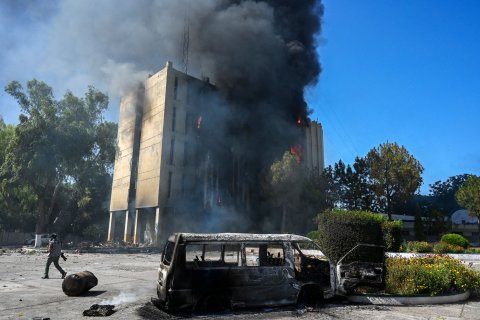
For the readers from around the world who say, "that's happening in Pakistan and that's not my problem," what would you say? Why should people around the world be invested in the fate of Pakistan and your fate, specifically? Why does it matter to them? And what are the concerns if things do not turn out well?
You know, I'm not really that worried about my own fate, because that's secondary. The main thing is the future of Pakistan, which is what I'm worried about. Because I really fear now that this path which we are being taken on, there is nothing but darkness ahead.
Because, apart from anything else, our whole democracy is being dismantled. And remember, our journey to democracy has had many hiccups, because half the time we were ruled by military dictators, each time around a decade, and once the dictator left, then we had to start all over again. And so, then the whole process will start again.
And unfortunately, we had these two families who would intermittently rule this country, they also have three times in power. And so, from that, the progress started with our media. Twenty years, as I said, our media started asserting its independence, until then it was controlled. The government controls the media. The government controls the judiciary.
So, this 20-year period by the Musharraf martial law was liberal compared to what is going on right now. Because I was in the opposition, I went to jail for a few days in Musharraf's time, but it was liberal compared to what is happening now. So then started this movement called the Lawyers' Movement, which went for independence of the justice system. And secondly, the media asserted itself. Some of the media, some of the journalists actually suffered in this time. But we progressed. So, we had moved to a point when we are actually moving towards a genuine democracy.
What has now happened is that this is basically rolled back everything. And unless there's a course correction, by which I mean, free and fair elections, it means basically, that the country has no future, because the economy without rule of law is not going to pick up. Our biggest problem is that, because out of 140 countries, Pakistan on the rule of law index is 129. And this is before this crackdown happened. Now God knows where we are, we'll be closer to Myanmar and all these countries' model because we must have slipped much further back, because then at least there was a judiciary that was protecting us. Now the judiciary is completely subdued.
I dissolved my two provincial governments because we couldn't perform, so we dissolved the assemblies, and the Constitution clearly states that the elections had to be held in 90 days. The federal government refused. After I dissolved my governments, I then went to the Supreme Court, the Supreme Court ordered the elections to be on May 14. The government refused. So, if the government doesn't listen to the Supreme Court, what confidence would investors have in investing in this country?
So, the opposite has happened. Rather than any investment coming into Pakistan, there's a flight of capital. People are taking their money out of the country. In the past eight, nine months, 900 professionals have left Pakistan. I run the only specialized cancer hospital in Pakistan, a charity hospital, and it's very difficult to attract cancer specialists because they are in great demand all over the world. And any specialist can get three to four times the salary which he gets here. So, 10 percent of our consultants from our hospital are leaving. Such is this situation right now.
And this would be happening everywhere. People who can get jobs abroad, who are professionals, they are the ones you don't want to lose. So, in this hopelessness, where we are headed right now, with a bunch of guys who have failed consistently, 60 percent of the cabinet was on bail on corruption cases, the sitting prime minister was under trial for one of the biggest scandals, and General Bajwa stopped his cases because he could, and the guy [Sharif] is now the prime minister.
So, in the way we are headed right now, there is hopelessness. And the hope will come with free and fair elections.
As to your point, "Why should the world worry about us?" The world should not worry about what is happening to me. It should be worried about—and I'm talking about the Western world—the professed values of rule of law, of human rights, fundamental rights, custodial torture, democracy. All those professed values are completely being violated in Pakistan.
You can't just use these things when you want to beat up China on Hong Kong or on Uyghurs, or Russia. You have to be consistent. When they see these violations going on, they should speak out. But, having said that, countries always fix their problems from within. I don't expect any interference from outside, like they did in Afghanistan or Iraq to bring in democracy.
But condemnation of values that are professed, they should be a bit consistent in that. There's a complete silence from the U.S. government and the British government, and they're saying it's an internal matter. Since when were human rights violations and custodial torture and democracy being wound up—how can that be purely an internal matter? Because they comment about everywhere else.
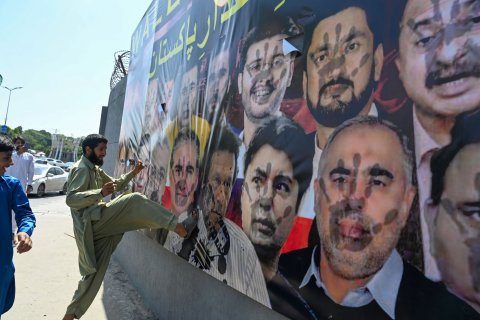
And I have to ask if you see any parallel between what's happening to you and what's happening in the U.S. right now, given yet another indictment against our former president, the first time in history, and concerns here regarding rule of law and electoral integrity?
There's a lot of difference in what's happening in the U.S. For instance, when [former President Donald Trump] challenged his election, and he thought that there was electoral fraud, very quickly, it was proved to be wrong. It was found to be wrong immediately, because you have very good systems there. And secondly, the attack on Capitol Hill, I mean, if it happened in Pakistan, we would be the first to condemn it.
But if you are trying to say about me and Donald Trump, our worldviews and our ideologies are completely different. I am opposite to his neoliberal economics. And he thinks greed is a great thing because the more you make, the more you grow.
I'm not really against that because our country, we have a bad experience. Basically, there's a ruling elite that has captured our country. So, when I talk about real democracy and rule of law, I was inspired when, as a teenager, I went to England to study and then I played professional sport. It was the first time I discovered what is rule of law, because we had at that time martial law, you actually have rules there, you're not independent, you're not a free country. So, it's the first time I understood what rule of law meant.
And I used to compare my own society all the time, because half the time I was playing for a long time professional sport in England, and half the time I was in my own country. So, when I gave up cricket and started my politics, the main reason was rule of law. I called it Movement for Justice [the English name for Tehreek-e-Insaf], justice and rule of law. Because this elite was sucking the blood of our country. They were above law.
Either we were military, which was above law, or we had these politicians who would indulge in corruption, but they were above the law. They would not be challenged by our judiciary or institutions. And even when they were caught, they would then be given immunity from the corruption cases, which was given by what was called the NRO [National Reconciliation Ordinance] by Musharraf.
My whole movement was to bring the powerful under the law, which is the only difference between prosperous societies and poor societies. This is, as a 17-year-old, my experience of the world, the difference between prosperous countries and poor countries is just one: rule of law. If you have rule of law, you have prosperity. Because all the things, you attract investment, people feel safe.
In Pakistan's case, I mean, our people from here are investing in Dubai. Just in the last few years, $10.4 billion of property was bought by Pakistanis in Dubai, because they feel there's rule of law there. So not having rule of law means we are deprived of investment from the 10 million overseas Pakistanis. Ten million Pakistani's GDP is more than 250 million Pakistanis here. And if you could have attracted their investment, we would not have been in this problem right now. But the problem is they cannot invest in this country, because they do not trust our justice system.
And when you're 129 of 140 countries before this crackdown you can understand that they would go and invest in Dubai and Malaysia, in other countries, but they don't invest in this country. So, if we could only track their investment, Pakistan would be able to stand on its own feet. India and China when they opened up, the first investment started coming from overseas Chinese and overseas Indians.
Newsweek has reached out to Hussain Haqqani and the Pakistani Embassy to the United States for comment on allegations made throughout the interview.
Reached for comment, a U.S. State Department spokesperson referred Newsweek to deputy spokesperson Vedant Patel's remarks during a press conference Tuesday in response to Khan's allegations that Washington was manipulated into backing efforts to oust him.
"These allegations are categorically false; you have heard me say this before. Pakistani politics are a matter for the Pakistani people to decide and for them to pursue within the auspices of their own constitution and laws," Patel said at the time. "The U.S. values our longstanding cooperation with Pakistan, and we've always viewed a prosperous and democratic Pakistan as critical to U.S. interests. And that remains unchanged."










